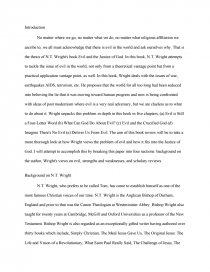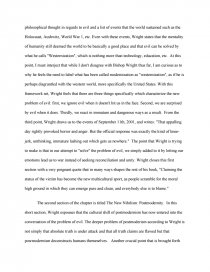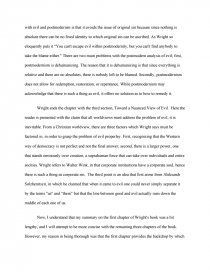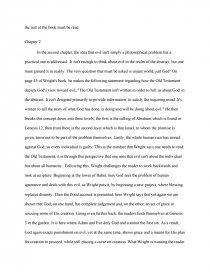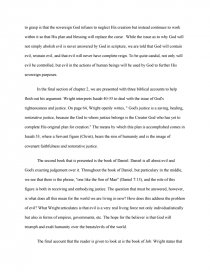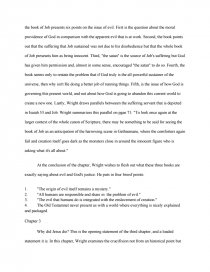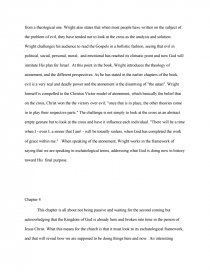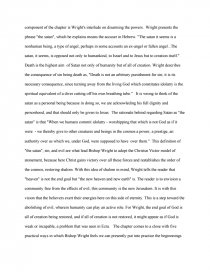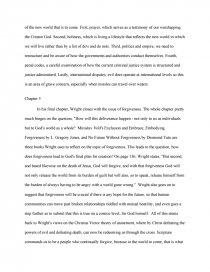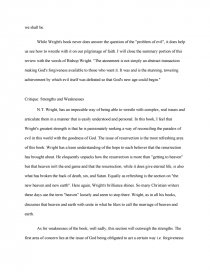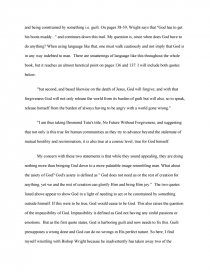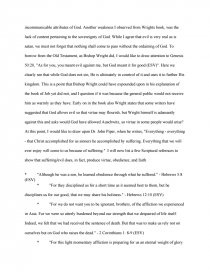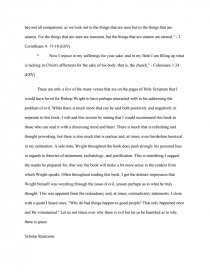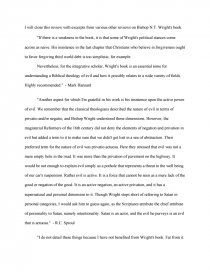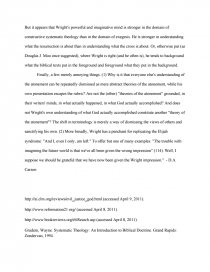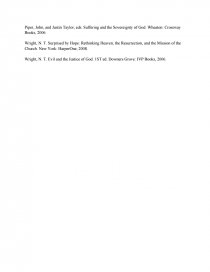Evil And The Justice Of God
Essay by arod21 • May 2, 2011 • 5,583 Words (23 Pages) • 2,293 Views
Essay Preview: Evil And The Justice Of God
Introduction
No matter where we go, no matter what we do, no matter what religious affiliation we ascribe to, we all must acknowledge that there is evil in the world and ask ourselves why. That is the thesis of N.T. Wright's book Evil and the Justice of God. In this book, N.T. Wright attempts to tackle the issue of evil in the world, not only from a theoretical vantage point but from a practical application vantage point, as well. In this book, Wright deals with the issues of war, earthquakes AIDS, terrorism, etc. He proposes that the world for all too long had been seduced into believing the lie that it was moving toward human progress and now is being confronted with ideas of post modernism where evil is a very real adversary, but we are clueless as to what to do about it. Wright unpacks this problem in depth in this book in five chapters, (a) Evil is Still a Four-Letter Word (b) What Can God Do About Evil? (c) Evil and the Crucified God (d) Imagine There's No Evil (e) Deliver Us From Evil. The aim of this book review will be to take a more thorough look at how Wright views the problem of evil and how it fits into the Justice of God. I will attempt to accomplish this by breaking this paper into four sections: background on the author, Wright's views on evil, strengths and weaknesses, and scholary reviews.
Background on N.T. Wright
N.T. Wright, who prefers to be called Tom, has come to establish himself as one of the most famous Christian voices of our time. N.T. Wright is the Anglican Bishop of Durham, England and prior to that was the Canon Theologian at Westminister Abbey. Bishop Wright also taught for twenty years at Cambridge, McGill and Oxford Universities as a professor of the New Testament. Bishop Wright is also regarded as an exceptionally gifted writer having authored over thirty books which include, Simply Christian, The Meal Jesus Gave Us, The Original Jesus: The Life and Vision of a Revolutionary, What Saint Paul Really Said, The Challenge of Jesus, The Meaning of Jesus: Two Visions, Surprised by Hope, as well as many others. Perhaps, his most well known and highly regarded literary contribution has been Jesus and the Victory of God, which is part of his six-volume series entitled Christian Origins and the Question of God, which he is currently in hopes of completeing. Bishop Wright is also married and has four children and two grandchildren.
Chapter 1
The first chapter of Wright's book is called Evil Is Still A Four - Letter Word. The chapter itself is broken down into four sections, and I will attempt to summarize Wright's main points in this order, while also giving my personal critique. From the outset, the title itself, while being witty, I find to be a bit trivial and lacking in maturity. Wright decides to use this catchy title so that the reader will associate evil with all the other vulgar four-letter words in the English language, but it seems to me that he does this more so to be considered relevant and hip instead of establishing himself as the authoritive expert. However, the title isn't what is up for debate, so let us move on to the first section of the chapter titled, The New Problem of Evil.
Wright begins by stating that the old ways of thinking about the problem of evil were more of a theological/theoretical vantage point where evil was never truly addressed and people tended to maintain an optimistic mindset. He then introduces the earthquake that took place in Lisbon on All Saint's Day in 1775 and also shattered all the optimisim of the previous generations. Wright's point is that since the events of 1775, European thought has been wrestling to come to terms with the issue of evil from the experiental position. He then goes on to name the great thinkers of the enilghtment, such as Voltaire, Rousseau, Kant, and Hegel, and presents them as men not so much trying to come to terms with evil but more so as men who were trying to learn how to cope with evil. We are then given a brief summary of the progression of philosophical thought in regards to evil and a list of events that the world sustained such as the Holocaust, Aushwitz, World War 1, etc. Even with these events, Wright states that the mentality of humanity still deemed the world to be basically a good place and that evil can be solved by what he calls "Westernization", which is nothing more than technology, education, etc. At this point, I must interject that while I don't disagree with Bishop Wright thus far, I am curious as to why he feels the need to label what has been called modernization as "westernization", as if he is perhaps disgruntled with the western world, more specifically the United States. With this framework set, Wright feels that there are three things specifically which characterize the new problem of evil: first, we ignore evil when it doesn't hit us in the face. Second, we are surprised by evil when it does. Thirdly, we react in immature and dangerous ways as a result. From the third point, Wright draws us to the events of September 11th, 2001, and writes: "That appalling day rightly provoked horror and anger. But the official response was exactly the kind of knee-jerk, unthinking, immature lashing out which gets us nowhere." The point that Wright is trying to make is that in our attempt to "solve" the problem of evil, we simply added to it by letting our emotions lead us to war instead of seeking reconciliation and unity. Wright closes this first section with a very poignant quote that in many ways shapes the rest of his book, "Claiming the status of the victim has become the new multicultural sport, as people scramble for the moral high ground in which they can emerge pure and clean, and everybody else is to blame."
The second section of the chapter is titled The New Nihilism: Postmodernity. In this short section, Wright espouses that the cultural shift of postmodernism has now entered into the conversation of the problem of evil. The deeper problem of postmoderism according to Wright is not simply that absolute truth is under attack and that all truth claims are flawed but that posrmodernism deconstructs humans themeselves. Another crucial point that is brought forth with evil and postmoderism is that it avoids the issue of original sin because since nothing is absolute there can be no fixed identity to which original sin can be ascribed. As Wright so eloquently puts it "You can't escape evil within postmodernity, but you can't find anybody to take the blame either." There are two main problems with the postmodern analysis of evil; first, postmodernism is dehumanizing. The reason that it is dehumanizing is that
...
...
